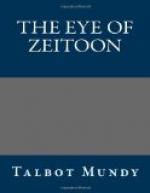A minute later we heard his voice uplifted in command, and the business of shepherding those women and children was taken out of our hands by a man who understood the business. The intoxicating sounds that armed men make as they evolve formation out of chaos in the darkness came in through open door and windows, and in another moment Kagig was back again with a hand on each door-post.
“You have brought all those cartridges!”
He thrust out both hands in front of him, and made the knuckles of every finger crack like castanets. In another second he was gone again. But we knew we were now forgiven all our sins of omission.
Somewhere about midnight, with a nearly full moon rising in a golden dream above the rim of the ravine, we started. And no wheeled vehicle could have followed by the track we took. It was no mean task for men on foot, and our burdened animals had to be given time. Whether or not Kagig slept, as he had said he would, on horse-back, he kept himself and our prisoners out of sight somewhere in the van; and this time the rear was brought up by a squadron of ragged irregular horse that would have made any old campaigner choke with joy to look at them.
Drill those men knew very little of—only sufficient to make it possible to lead them. No two men were dressed alike, and some were not even armed alike, although stolen Turkish government rifles far predominated. But they wore unanimously that dare-devil air, not swaggering because there is no need, that has been the key to most of the sublime surprises of all war. The commander, whose men sit that way in the saddle and toss those jokes shoulder over shoulder down the line, dare tackle forlorn hopes that would seem sheer leap-year lunacy to the martinet with twenty times their number.
“Who’d have thought it?” said Fred. “We’ve all heard the Turk was a first-class fighting man, but I’d rather command fifty of these, than any five hundred Turks I ever saw.
There was no gainsaying that. Whoever had seen armies with an understanding eye must have agreed.
“Turks don’t hate Armenians for their faults,” I answered. “From what I know of the Turk he likes sin, and prefers it cardinal. If Armenians were mere degenerates, or murdering ruffians like the Kurds, the Turk would like them.”
Fred laughed.
“Then if a Turk liked me, you’d doubt my social fitness?”
“Sure I would, if he liked you well enough to attract attention. The fact that the Turk hates Armenians is the best advertisement Armenians have got.”
We were entering the heart of savage hills that tossed themselves in ever increasing grandeur up toward the mist-draped crags of Kara Dagh, following a trail that was mostly watercourse. The simple savagery of the mountains laid naked to view in the liquid golden light stirred the Armenians behind us to the depths of thought; and theirs is a consciousness of warring history; of dominion long since taken from them, and debauched like pearls by swine; of hope, eternally upwelling, born of love of their trampled fatherland. They began to sing, and the weft and woof of their songs were grief for all those things and a cherished, secret promise that a limit had been set to their nation’s agony.




